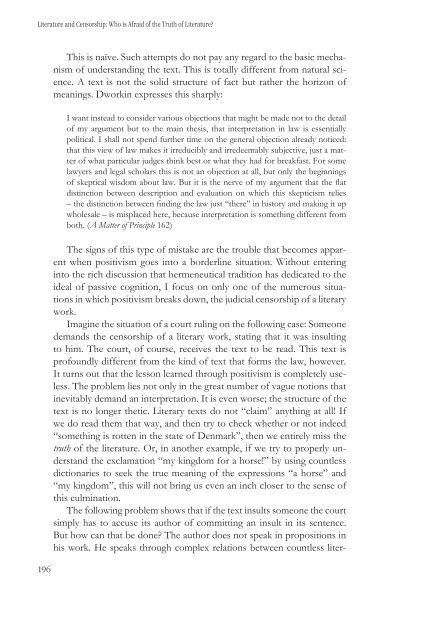Literatura in cenzura - Društvo za primerjalno književnost - ZRC SAZU
Literatura in cenzura - Društvo za primerjalno književnost - ZRC SAZU
Literatura in cenzura - Društvo za primerjalno književnost - ZRC SAZU
- No tags were found...
Create successful ePaper yourself
Turn your PDF publications into a flip-book with our unique Google optimized e-Paper software.
Literature and Censorship: Who is Afraid of the Truth of Literature?196This is naïve. Such attempts do not pay any regard to the basic mechanismof understand<strong>in</strong>g the text. This is totally different from natural science.A text is not the solid structure of fact but rather the horizon ofmean<strong>in</strong>gs. Dwork<strong>in</strong> expresses this sharply:I want <strong>in</strong>stead to consider various objections that might be made not to the detailof my argument but to the ma<strong>in</strong> thesis, that <strong>in</strong>terpretation <strong>in</strong> law is essentiallypolitical. I shall not spend further time on the general objection already noticed:that this view of law makes it irreducibly and irredeemably subjective, just a matterof what particular judges th<strong>in</strong>k best or what they had for breakfast. For somelawyers and legal scholars this is not an objection at all, but only the beg<strong>in</strong>n<strong>in</strong>gsof skeptical wisdom about law. But it is the nerve of my argument that the flatdist<strong>in</strong>ction between description and evaluation on which this skepticism relies– the dist<strong>in</strong>ction between f<strong>in</strong>d<strong>in</strong>g the law just “there” <strong>in</strong> history and mak<strong>in</strong>g it upwholesale – is misplaced here, because <strong>in</strong>terpretation is someth<strong>in</strong>g different fromboth. (A Matter of Pr<strong>in</strong>ciple 162)The signs of this type of mistake are the trouble that becomes apparentwhen positivism goes <strong>in</strong>to a borderl<strong>in</strong>e situation. Without enter<strong>in</strong>g<strong>in</strong>to the rich discussion that hermeneutical tradition has dedicated to theideal of passive cognition, I focus on only one of the numerous situations<strong>in</strong> which positivism breaks down, the judicial censorship of a literarywork.Imag<strong>in</strong>e the situation of a court rul<strong>in</strong>g on the follow<strong>in</strong>g case: Someonedemands the censorship of a literary work, stat<strong>in</strong>g that it was <strong>in</strong>sult<strong>in</strong>gto him. The court, of course, receives the text to be read. This text isprofoundly different from the k<strong>in</strong>d of text that forms the law, however.It turns out that the lesson learned through positivism is completely useless.The problem lies not only <strong>in</strong> the great number of vague notions that<strong>in</strong>evitably demand an <strong>in</strong>terpretation. It is even worse; the structure of thetext is no longer thetic. Literary texts do not “claim” anyth<strong>in</strong>g at all! Ifwe do read them that way, and then try to check whether or not <strong>in</strong>deed“someth<strong>in</strong>g is rotten <strong>in</strong> the state of Denmark”, then we entirely miss thetruth of the literature. Or, <strong>in</strong> another example, if we try to properly understandthe exclamation “my k<strong>in</strong>gdom for a horse!” by us<strong>in</strong>g countlessdictionaries to seek the true mean<strong>in</strong>g of the expressions “a horse” and“my k<strong>in</strong>gdom”, this will not br<strong>in</strong>g us even an <strong>in</strong>ch closer to the sense ofthis culm<strong>in</strong>ation.The follow<strong>in</strong>g problem shows that if the text <strong>in</strong>sults someone the courtsimply has to accuse its author of committ<strong>in</strong>g an <strong>in</strong>sult <strong>in</strong> its sentence.But how can that be done? The author does not speak <strong>in</strong> propositions <strong>in</strong>his work. He speaks through complex relations between countless liter-
















